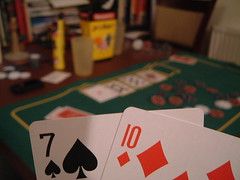- Bluff when it looks like someone could have a good hand. Take a look the cards the dealer has flipped on the table. If it is possible to have a good hand based on what you see on the table, now might be a good time to bluff. Just be careful though, someone may actually have that good hand. Keep an eye on your opponents. If they aren't betting strongly, now might be a good time for you to bluff.
- Poker bluffing is a great technique when other players appear to have a bad hand. Watch how everyone is acting. If you are playing with less experienced players, they could be making obvious signs that their hand is weak. Look for things like hesitancy when betting, or facial signs that show some distress or uncertainty. By betting strong when others have a weak hand, you are in fact encouraging them to fold.
- Take advantage of novice players that are betting big a bit to often. Chances are that they are bluffing more than they should. As soon as you have a strong hand. Bet big and put them in their place.
- Other players will likely make a mental note of your most recent bluff. Don't bluff again to soon or they may call you on it. Of course, if you get a strong hand right after you have bluffed, this can certainly work to your advantage. Try to pull others into the hand by making them think you are bluffing again. You can pull in a larger pot that way.
- Poker bluffing tends to work better with tight tables (tables with players that are playing cautiously). Loose players (players that play more aggresively) will tend to call your bluff more often than tight players. You might want to hold back on bluffing until any loose players at the table have folded or are out of the game.
- Bluffing works better in high, or no limit games. If the betting limit is low, there is little advantage to bluffing since you don't stand to gain a whole lot. Also, it's hard to scare other players into folding if you can only bet a small amount. Bluffing usually takes a big bet to get other players to fold.
- Bluff from a late position only. If you bluff to early, you run the risk of someone else having a strong hand. Wait to see if other players are checking and folding. This usually indicates that their hands are weak and presents a good opportunity for you to bluff and take the pot.
- Successful poker bluffing requires you to stay randam. Don't bluff to often and don't develop a pattern for bluffing. Keep other players on their toes and keep switching up your plays. You don't want anyone else to figure out your game and take you down.
- Be careful around inexperienced or bad poker players. Bluffing may not intimidate them and they may keep on playing even though you are portraying that you have a very strong hand. The card or cards they need might just show up on the turn or the river.
- Be careful playing good bluff situations too often. A particular scenario is before the flop. You are on of the last betters and most other players have folded or checked. If you always bet strong in this situation, other players might pick up on this pattern and take you down. Don't always take advantage of what looks to be a good bluffing opportunity.
Before you go, please take a moment to check out our deals on poker chip sets, poker tables, and poker cards. We have a big sale on right now, and we are offering free shipping on everything in our store!
Happy Gaming!





No comments:
Post a Comment